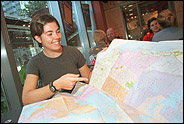kaleidoscope
Margot Hessing-Lewis: Her mettle to the pedal
 PHOTO: Owen Egan
PHOTO: Owen Egan |
|
Even though the trip finished at the beginning of August, it was only when everyone went back to school that "it really hit."
But then, this was no ordinary trip. This was 7,000 kilometres of immense social, geographical and personal intensity. This was crossing the country on two wheels in the name of raising awareness about air quality, testing one's limits, getting intimate with this country's geography, furthering the knowledge of road and travel conditions for trans-Canada cyclists and, finally, fun and friendship.
Margot Hessing-Lewis, a fourth year geography and conservation biology student, was part of the six-member "Powershift 2000," the name given the 12-wheeled mission to denote the collective need to shift to non-polluting, renewable sorts of power.
Her particular role on the journey involved analyzing road conditions and possible accommodations for future travellers. Every day she would record the width, traffic conditions and quality of the road shoulder and surface.
Hessing-Lewis also used a GPS (geographical positioning system), borrowed from the geography department, to coordinate the longitude and latitude. That data, once downloaded into a GIS (geographical information systems) computer program, will map the route taken by the team.
This year, for an independent research course, Hessing-Lewis is combining the GIS data with her qualitative recordings in order to produce a sort of digital atlas for the potential cross-country cyclist. "It could be hotlinked to digital pictures and local maps," says geography professor John Lewis, who is supervising the project.
The project could end up being a book to serve the "sub-culture of people crossing the country by bike," says Hessing-Lewis, noting that while "many books tell you routes, not many tell you the conditions and places to stop."
When the student went to Lewis last spring with her proposal for a geography project on the road, he encouraged her "to take a pleasurable trip and do something academic." It's not the first time a geography student has crossed the country but it is the first time one has done it with a credited project in mind and done it going east to west, "which is hard," notes Lewis, himself a cyclist.
Odd as it may sound, the team found the prairies more arduous than the Rockies. "You're actually going uphill across the prairies," notes Hessing-Lewis. "It's downhill from Calgary to Banff," she continues, describing the majesty of the great mountains.
"The Rockies were incredibly picturesque by their sheer immensity. You see them pop up at Calgary, then you ride right into them."
Pulling out her map of Canada, Hessing-Lewis retraces the route from Sydney, Nova Scotia, through PEI and New Brunswick -- "where there were lots of hills." She recalls the picturesque quality of rural Quebec, pedalling "steeple to steeple." In Ontario, the team had its only night out, spent at a pub in Sioux Narrows on Canada Day. Crossing the prairies, there were mosquitoes to fight in Winnipeg, the tail end of the Crane Lake (Alberta) tornado to hide from and a heatwave in the Okanagan Valley.
While there was adversity to be faced, the team was never far from help thanks to two cell phones and the loan of a Toyota Prius, a gas-electric hybrid lent by the Japanese car company for testing on Canadian highways.
The guest drivers carried all the food and camping gear and included a number of the parents, including David Suzuki, whose daughter was cycling along with Hessing-Lewis. The female cyclists were treated more than once to campside breakfasts, courtesy of the famous host of CBC's The Nature of Things. The Suzuki Foundation supported the trip by providing documentation and handling the media.
The Prius was also essential in the case of accidents. Hessing-Lewis drove it for one week to let her stitched-up knee heal following a spill into the ditch.
One of the most spectacular, yet disturbing, scenes for the team was riding down into the Fraser River Valley. "The valley is stunning; then you realize that the colour in the sky is pollution. It's a bit depressing."
But not discouraging. Hessing-Lewis was buoyed by the response of the people they met along the way whenever the team stopped to talk about the effects of air pollution on health. "I think the question of air quality really grabs people because that's what affects your health."
 |
||||
|
That, I guess, is the glory of his kind of prime ministership: He didn't give a goddamn what people said if [what he was doing] was right. |
||||
Managing to get it right
 PHOTO: Tzigane
PHOTO: Tzigane |
|
Who says that management students are all corporate shark wannabees, anxious to trade in their business degrees for expense accounts and Hugo Boss suits?
If a new student club is any indication, the next generation of business leaders might be capitalists with a conscience.
The goal of McGill Business Watch is to raise questions about how the corporate sector conducts itself with regard to environmental matters and other social concerns.
The impetus for the club stemmed from a course on the social context of business recently offered by sessional instructor Kariann Aarup.
"We looked at the impact of business on society and I found that quite refreshing," says Business Watch member Sebastien Grenier.
Once Grenier and his classmates started discussing issues such as big business's track record in the Third World, they found they didn't want to stop once the course ended. They started organizing the club over the summer and already have an impressive 95 members.
The club will be inviting guest speakers, organizing discussion forums and establishing an internship program to give management students the opportunity to work with community groups and non-governmental organizations.
"We're not against capitalism," explains Grenier, "but we do want to raise the consciousness of future managers. We want them to see that there can be serious social consequences to doing business."
 |
||||
|
He took risks to help make Canada a better place. He didn't just take the American view. He had a unique view. Even in 100 years, he'll still be someone Canadians will study. |
||||
Theses for sale
 |
|
A controversial deal between the National Library of Canada and the retailing web site Contentville.com that resulted in the sale of theses written by Canadian scholars has been put on ice -- at least for the time being.
There was a widespread outcry among Canadian academics in recent months when it became known that theses written in this country were for sale on the site.
"We can't commercialize public research," said Rick Telfer, deputy chair of the National Graduate Council, which represents Canadian graduate students. "The public paid and the public owns it. Making academics buy it back from some corporation is absurd."
Contentville earned the right to sell the theses through a deal with UMI Dissertations Publishing, which in turn had an arrangement in place with the National Library.
For its part, the National Library says it hasn't done anything underhanded; it has only accepted new additions to its thesis collection on the condition that the author of the thesis signs a non-exclusive licence granting the library unrestricted authority to reproduce and sell copies of the work. Authors retain copyright and UMI tracks all sales for royalty payments. According to the library's web site, the deal with UMI supports "Canadian theses to make them better known worldwide."
Outgoing Vice-Principal (Information Systems and Technology) Bruce Pennycook recently indicated that two theses he supervised at McGill were available on Contentville.
Contentville's Stuart Jordan told The Chronicle of Higher Education that he is hopeful about arriving at an agreement with Canadian academic groups to make the sale of Canadian theses possible on the web site once again.
 |
||||
|
Madam, if we have a Charter of Rights in this country, we owe it to this one man. Canada owes a lot to him, and I, for one, am in his debt. |
||||

